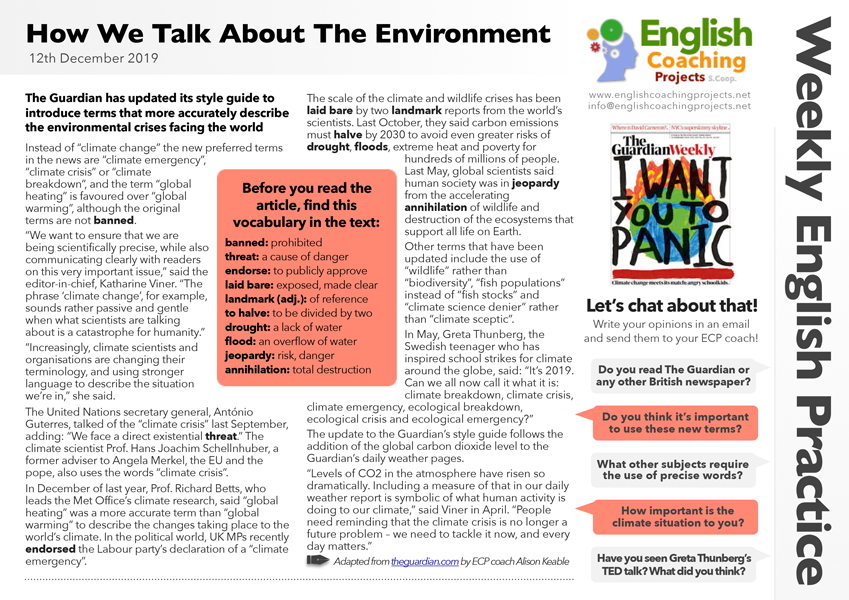The Guardian has updated its style guide to introduce terms that more accurately describe the environment and the environmental crises facing the world.
Click on the image to download the pdf
Read and check you understand this vocabulary before you read and listen to the text:
Before you read the article, find this vocabulary in the text:
banned: prohibited
threat: a cause of danger
endorse: to publicly approve
laid bare: exposed, made clear
landmark (adj.): of reference
to halve: to be divided by two
drought: a lack of water
flood: an overflow of water
jeopardy: risk, danger
annihilation: total destruction
Listen to the audio (refresh the page if it’s not visible)
The Guardian has updated its style guide to introduce terms that more accurately describe the environmental crises facing the world
Instead of “climate change” the new preferred terms in the news are “climate emergency”, “climate crisis” or “climate breakdown”, and the term “global heating” is favoured over “global warming”, although the original terms are not banned.
“We want to ensure that we are being scientifically precise, while also communicating clearly with readers on this very important issue,” said the editor-in-chief, Katharine Viner. “The phrase ‘climate change’, for example, sounds rather passive and gentle when what scientists are talking about is a catastrophe for humanity.”
“Increasingly, climate scientists and organisations are changing their terminology, and using stronger language to describe the situation we’re in,” she said.
The United Nations secretary general, António Guterres, talked of the “climate crisis” last September, adding: “We face a direct existential threat.” The climate scientist Prof. Hans Joachim Schellnhuber, a former adviser to Angela Merkel, the EU and the pope, also uses the words “climate crisis”.
In December of last year, Prof. Richard Betts, who leads the Met Office’s climate research, said “global heating” was a more accurate term than “global warming” to describe the changes taking place to the world’s climate. In the political world, UK MPs recently endorsed the Labour party’s declaration of a “climate emergency”.
The scale of the climate and wildlife crises has been laid bare by two landmark reports from the world’s scientists. Last October, they said carbon emissions must halve by 2030 to avoid even greater risks of drought, floods, extreme heat and poverty for hundreds of millions of people. Last May, global scientists said human society was in jeopardy from the accelerating annihilation of wildlife and destruction of the ecosystems that support all life on Earth.
Other terms that have been updated include the use of “wildlife” rather than “biodiversity”, “fish populations” instead of “fish stocks” and “climate science denier” rather than “climate sceptic”.
In May, Greta Thunberg, the Swedish teenager who has inspired school strikes for climate around the globe, said: “It’s 2019. Can we all now call it what it is: climate breakdown, climate crisis, climate emergency, ecological breakdown, ecological crisis and ecological emergency?”
The update to the Guardian’s style guide follows the addition of the global carbon dioxide level to the Guardian’s daily weather pages.
“Levels of CO2 in the atmosphere have risen so dramatically. Including a measure of that in our daily weather report is symbolic of what human activity is doing to our climate,” said Viner in April. “People need reminding that the climate crisis is no longer a future problem – we need to tackle it now, and every day matters.”
Adapted from theguardian.com by ECP coach Alison Keable
Let’s chat about that!
Write your opinions in an email and send them to your ECP coach!
- Do you read The Guardian or any other British newspaper?
- Do you think it’s important to use these new terms?
- What other subjects require the use of precise words?
- How important is the climate situation to you?
- Have you seen Greta Thunberg’s TED talk? What did you think?


